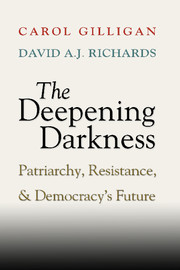Book contents
- Frontmatter
- Contents
- Acknowledgments
- Introduction and Overview
- Part One Roman Patriarchy: Entering the Darkness
- Part Two Resistance Across Time and Culture
- 6 Resistance: Religion
- 7 Resistance: Psychology
- 8 Resistance: The Artists
- 9 Resistance: Politics
- Part Three Democracy's Future
- Conclusion
- Notes
- Bibliography
- Index
6 - Resistance: Religion
Published online by Cambridge University Press: 01 September 2010
- Frontmatter
- Contents
- Acknowledgments
- Introduction and Overview
- Part One Roman Patriarchy: Entering the Darkness
- Part Two Resistance Across Time and Culture
- 6 Resistance: Religion
- 7 Resistance: Psychology
- 8 Resistance: The Artists
- 9 Resistance: Politics
- Part Three Democracy's Future
- Conclusion
- Notes
- Bibliography
- Index
Summary
We turn now to the closer study of resistance to patriarchy, beginning with the sources of and the difficulties of such resistance within religions wedded to patriarchal forms. Christianity becomes our prime example because of the tension between the historical Jesus and the Augustinian tradition that became hegemonic in Europe for well over a millennium. The virulent anti-Semitism that in part reflects Augustine's characterization of the Jews as “carnal Israel” heightens this tension and suggests the role that sexuality plays in this story. And so does the growth of modern constitutional democracy, represented by Bayle and Locke, who as radical Christians questioned intolerance. We will consider the Quakers who objected to slavery, the American abolitionist feminists who identified racism and sexism as interlocked evils, and Martin Luther King, Jr., whose campaign against injustice was based on an appeal to nonviolent resistance. In the contemporary priest sexual-abuse scandal, we see the legacy of celibacy, and we end with a former Catholic priest, James Carroll, who tells a powerful life story that moves in the opposite direction from that of Augustine, from celibacy to sexual love and from resistance to unjust war to a rejection of Christian anti-Semitism.
The growing evidence offered by feminist scholars indicates that the orthodox Christian tradition repressed the texts of the early Christian period that contested its patriarchalism.
- Type
- Chapter
- Information
- The Deepening DarknessPatriarchy, Resistance, and Democracy's Future, pp. 121 - 158Publisher: Cambridge University PressPrint publication year: 2008
- 1
- Cited by



